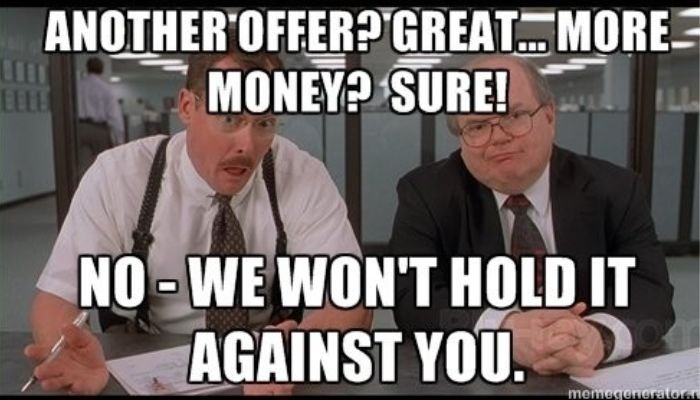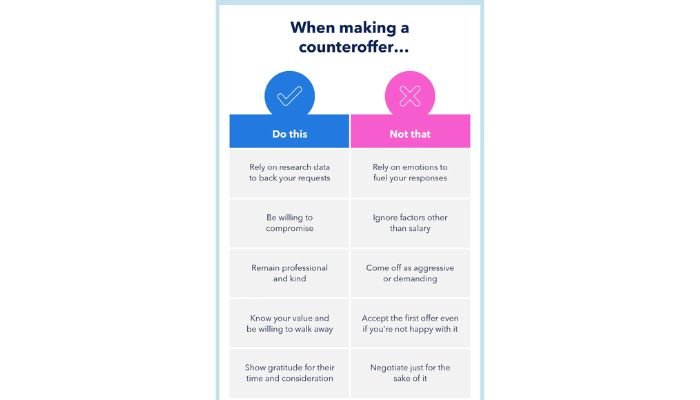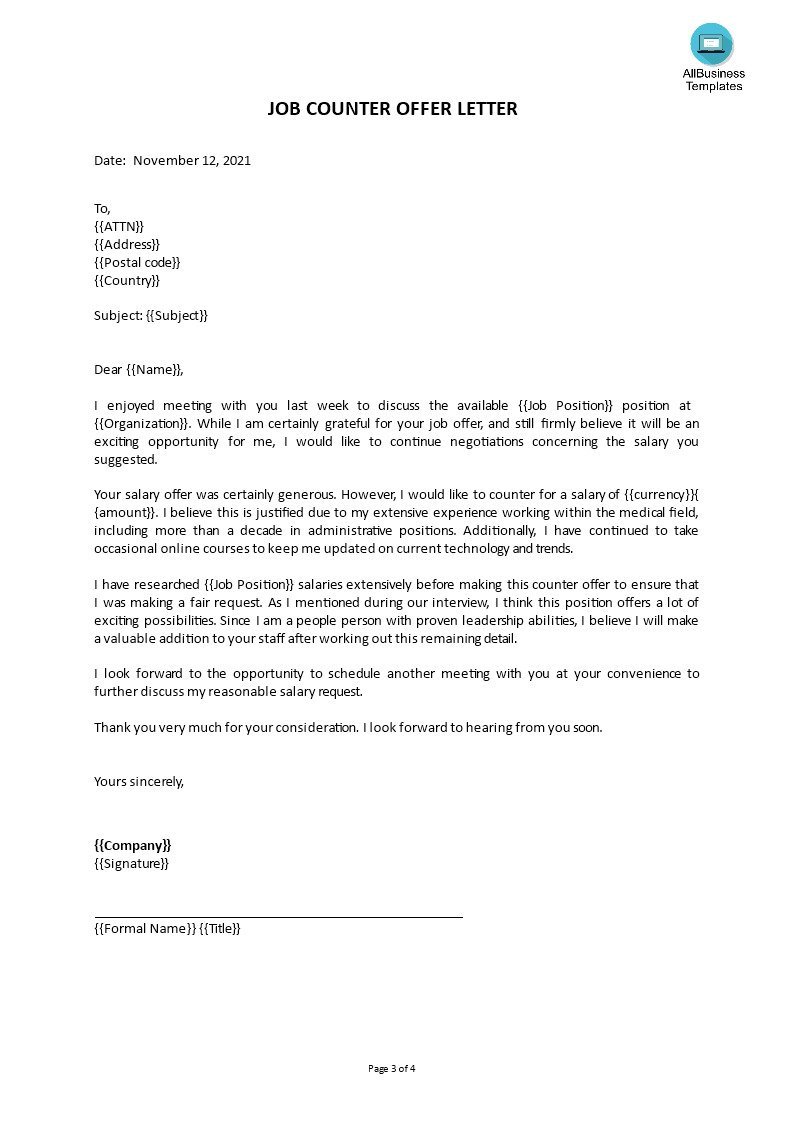Counteroffer Letter: Strategies for Effective Salary Negotiation

Salary negotiation is an incredibly important—yet often overlooked—part of almost any job search. One might hesitate or come off too strong in negotiating their worth – so taking the time to craft and advocate for your desired compensation is really crucial in hiring conversations because it sets you up for success both in the application process and throughout your career.
Learning how to initiate salary negotiations effectively by drafting a personalized counteroffer letter can be essential to achieving your earning goals.
This outline will explore the writing process behind a successful counteroffer letter, understanding when it’s appropriate to send one, presenting counterpoints, and other tips aimed at negotiating the best offer possible from potential employers.
What Is a Counteroffer Letter?

A counteroffer letter is a written document that states the sender’s revised response to an employment offer. Its objective is to reciprocate the offer with mutually-beneficial terms instead of simply accepting or declining. It formally communicates and documents a negotiator’s disagreed salary arrangement and responsibilities with the hopes of arriving at some form of compromise before committing.
A successful counteroffer facilitates a constructive dialogue, points out offer deficiencies, and provides preciseness in necessary replacement strategies allowing all parties involved to make informed decisions.
Differentiating between a counteroffer and a negotiation conversation
A counteroffer letter is a written document that allows the candidate to formally oppose, refute or modify an employment offer. It’s a professional tool used for negotiating higher wages in salary negotiations, oftentimes solo or alongside-with additional benefits packages like insurance coverage assistance and so on.
Differentiating between a counteroffer and a negotiation conversation can be challenging but the general trend seen is that typically, during an open discussion focus will be placed either on what services/resources one could provide – from candidate’s view- or settle market inclination from employer’s side. Yet, in terms of preparing a substantiated ground sound offer, the best medium leading up towards success will always prove skillful handwriting presented with sufficient compelling argument expansion.
Significance of documenting a counteroffer in writing
Documenting a counteroffer in writing is important because it provides an interesting date and time-stamp for when the conversation occurred. Others besides the recipient can also see that this conversation had taken place, allowing them to understand both parties positions and negotiate a resolution during later meetings if needed.
It specifically clarifies what has already been said thus eliminating any potential miscommunication. By properly voicing one’s concerns in written form and respectfully inviting feedback, possible conflict between stakeholders are better sorted out initially prior to coming across bigger issues such as decreased morale or ill-will towards any omitted expectations before, during, or after employee program implementation. This promotes trust between all engaged by allowing open lines of communication during demands related conversations.
When to Send a Counteroffer Letter?
When it comes to an opportune moment for sending a counteroffer letter, two key considerations come into focus: one is that you should be in the final stages of your negotiation process and the other is that the accepted offer should be impending or near.
Sending out a prompt counteroffer letter shortly after communicating with potential employers shows respect for their timeline while empowering yourself to bring something valuable at arguably decisive moments during upper management discussions. Where delays may suggest lack of motivation, quick and well-thought follow-up bespeak proactive engagement from candidates.
Situations that warrant a counteroffer
Situations that warrant a counteroffer letter can vary depending on what steps have been taken throughout the negotiation process. If you find yourself in a situation where the initial offer may not meet the details outlined in the job description, could impede your long-term goals, or is lower than acceptable expectations based on comparable wages, then consider submitting a counteroffer to potentially ameliorate such circumstances. Instances such as these may be produced by situational negotiations due to experience, complexity of position duties and materials discussed between yourself and your employer beforehand.
Counteroffer Letter Writing Tips

1. Formatting and structure of the letter
When writing your counteroffer letter, always be sure to pay attention to the formatting and structure of your letter. (It’s part of being professional).
The language should reflect professionalism and politeness, but also be concise and clear in conveying your message. Additionally, make sure to address the recipient appropriately with “Dear Mr./Ms. [Name]” and end with “Sincerely” or “Best”.
As a matter of fact, a well-developed structure aside from properly introducing yourself and expressing gratitude would involve topics such as explaining why you believe you warrant a counteroffered salary and citing market data that support your claim. (Yep, there should be proofs). That is why it is necessary to provide examples demonstrating how you deserve a higher rate.
2. Being concise and clear in conveying your points
When drafting a counteroffer letter, it is important to be concise and clear in accurately conveying your motivations for why you believe the offer should change. Ensure that this goal is met by avoiding key pitfalls; such as rambling, getting off-topic and omitting necessary information.
Start each point strongly then finish short in order to facilitate or potentially encourage future conversations if needed. Remember clarity creates negotiability – eloquently expressing your claims together with strong evidence exhibiting an industry competitive value will ultimately leave the ball safely resting on employer’s court.
3. Addressing the recipient appropriately
When writing counteroffer letter, it is important to address the recipient appropriately. This will remove any misunderstandings that could arise during negotiations and foster a more professional tone in the communication. Begin by addressing them using their title and name followed by formal salutations thereafter.
Secondly, make a point to respect any confidentiality terms relating to salary discussions beforehand which should avoid any problematic misunderstanding when setting salary expectations for yourself.
4. Emphasizing the value you bring to the organization
The goal when emphasizing your value in a counteroffer letter is ultimately how you can be an asset to the organization. Briefly mention tangible accomplishments (staff managed, team-led project, tech achieved) and qualifications that make it clear just how critical your talents are; contributions to the company needs to be viewed practically and discussed fairly when negotiating. Keep this section brief but still informative – successful conversations are solved respectfully and with facts.
5. Expressing enthusiasm for the position while negotiating
Expressing enthusiasm for the position while negotiating is an important part of counteroffer letter writing. It’s essential to approach negotiations assertively and confidently without underselling yourself at the same time. When creating your counteroffer, maintain your composure and objectivity but also make sure to communicate your enthusiasm for the position.
Express both your excitement about joining the company and willingness to make a long-term commitment even while remaining mindful of managing expectations in regards to salary. Be clear yet concise in conveying interest with positive verbiage like “Excited for this opportunity” or “Grateful you considered me” which can make your negotiation more persuasive than adversaries tactics pushing purely financial benefit motivations from opposite sides.
Example of Counteroffer letter:
Other Considerations
Evaluating the employer’s response to your counteroffer
Evaluating the employer’s response to your counteroffer can be one of the most nerve-wracking yet critical parts of the negotiation process. You will want to determine whether or not they have acknowledged and addressed each point you included in your letter while putting into account factors that may influence their counteroffers, such as budgetary restrictions and company policies; Besides being mindful of these points, navigating conversations with diplomacy, patience, respect and understanding ensures stronger negotiating power derived from composure rather than antagonism.
Potential outcomes and preparing for different scenarios
Prepare for potential outcomes. You read it right; there are many possibilities, good or bad, that would result from your counteroffer. Research has actually indicated that most employers expect candidates to negotiate their initial offer, though some may be set in terms of salary paid and benefits provided.
To prepare for different scenarios, it is important to understand what you are looking for (for instance, time off X amount as opposed to a raise or larger bonus) and prioritize your needs accordingly. Being flexible on expectations can help a company arrive at agreeable solutions while maintaining transparency and portraying respectability at the same time.
Maintaining professionalism and positive relationships throughout the negotiation process
It is indeed crucial to remain professional and maintain strong relationships throughout the process of salary negotiation through a counteroffer letter. But how? Simply by remaining courteous , demonstrating respect and maintaining a positive attitude even when encountering disagreement.
Why? Well here’s the answer: Communicating openly with respect for the other party’s point of view is key for reaching a successful agreement in negotiations and avoiding potential conflict for both parties.
Being composed yet assertive will help you advocate your position while understanding why concessions are often hard or not feasible by others. Practicing mindful communication may enable both parties to mutually benefit from these later steps in the hiring process.
Conclusion
Writing a counteroffer letter can indeed seem intimidating, but preparing yourself is key to getting the salary and benefits package you deserve. Salary negotiation requires a mix of research, practice, skillful event planning, and the ability to stay professional while advocating for your value.
With these factors contributing to an effective overall negotiation experience, drafting up a solid foundation in the form of a counteroffer letter that accurately represents your interests could just be what salaried success looks like. More than any negotiated figure or benefit won, you must be maintaining positive, healthy relationships with stakeholders throughout the entire process.
- Mastering Internal Mobility: A Comprehensive Guide to Success - August 10, 2023
- Effective Recruiting Strategies in a Competitive Sales Labor Market - July 27, 2023
- 6 Essential Factors to Attract Top Talent - July 19, 2023

